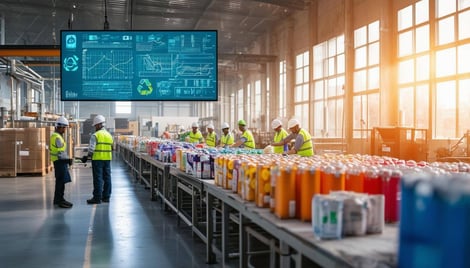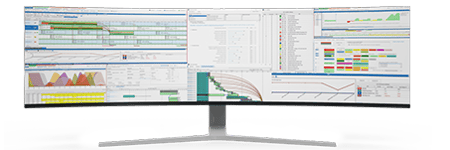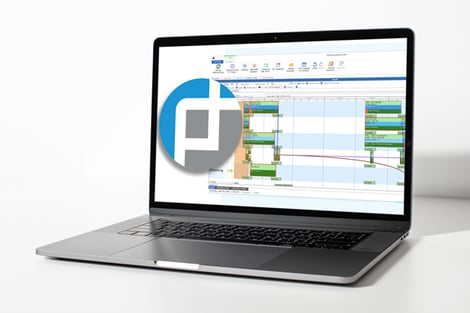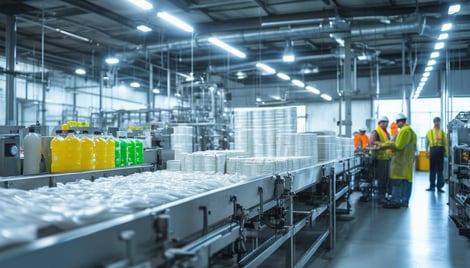Reducing Packaging Waste: A Strategic Priority for Operations Directors in Food and Beverage Manufacturing
Reducing packaging waste has become more than a trend; it’s a strategic necessity for food and beverage manufacturing facilities. For Operations Directors, the challenge is twofold: ensuring operational efficiency while meeting the growing demand for sustainable practices.
Leveraging advanced manufacturing solutions, such as the integration of PlanetTogether with enterprise resource planning (ERP) systems like SAP, Oracle, Microsoft Dynamics, Kinaxis, or Aveva, can help strike this delicate balance. Here’s how.

Understanding the Scale of the Problem
Packaging waste accounts for a significant portion of industrial waste, with food and beverage manufacturing being one of the largest contributors. Studies show that packaging waste comprises approximately 30% of total municipal solid waste in developed countries, underscoring the pressing need for actionable solutions. Excessive packaging, inefficiencies in production processes, and a lack of recycling initiatives often compound the problem.
For Operations Directors, reducing packaging waste is not only about compliance with environmental regulations but also about addressing consumer expectations. A Nielsen survey revealed that 73% of global consumers are willing to change consumption habits to reduce environmental impact. Ignoring this shift could mean losing market share to more eco-conscious competitors.
![]()

The Role of Advanced Planning and Scheduling in Waste Reduction
One of the keys to reducing packaging waste lies in optimizing the manufacturing process. Advanced Planning and Scheduling (APS) tools like PlanetTogether play a crucial role in achieving this. When integrated with robust ERP systems such as SAP or Oracle, these tools enable:
Precise Demand Forecasting: Accurate forecasting ensures that only the required amount of packaging materials is procured and used, minimizing surplus and obsolescence.
Production Optimization: Scheduling production runs to minimize changeovers reduces the risk of generating waste due to packaging errors or unused materials.
Real-Time Monitoring: Integration with systems like Aveva’s manufacturing execution system (MES) provides real-time data on packaging waste, allowing for immediate corrective actions.

Integration in Action: PlanetTogether and ERP Systems
Sustainable Packaging: A Strategic Focus
While operational efficiencies are crucial, a broader focus on sustainable packaging can significantly impact waste reduction. Many leading food and beverage manufacturers are adopting initiatives such as:
Material Innovation: Transitioning to biodegradable, compostable, or fully recyclable materials.
Lightweight Packaging: Reducing the amount of material used without compromising product safety or quality.
Reusable Packaging Systems: Implementing systems where packaging can be returned and reused, such as refillable bottles or containers.
Operations Directors can spearhead these initiatives by collaborating with R&D and procurement teams to identify viable options. Moreover, using tools like PlanetTogether’s APS, integrated with platforms like Microsoft Dynamics, can streamline the implementation of sustainable packaging solutions by ensuring seamless coordination across departments.
Regulatory Compliance and Risk Mitigation
Governments worldwide are implementing stricter regulations to curb packaging waste. For instance, the European Union’s Circular Economy Action Plan aims to make all packaging recyclable by 2030. In the U.S., states like California have introduced Extended Producer Responsibility (EPR) laws, holding manufacturers accountable for the lifecycle of their packaging.
Failure to comply can result in hefty fines and reputational damage. Integration of PlanetTogether with compliance-focused platforms like Kinaxis can help Operations Directors:
Track and document compliance with packaging regulations.
Simulate the impact of potential regulatory changes on operations.
Develop risk mitigation strategies through data-driven insights.
By proactively addressing compliance, manufacturers can avoid disruptions and maintain a competitive edge.
Leveraging Data for Continuous Improvement
Data is at the heart of reducing packaging waste. Advanced tools like PlanetTogether, when integrated with ERP systems, provide a unified view of production, inventory, and waste metrics. For Operations Directors, this data can be used to:
Identify Waste Hotspots: Pinpoint areas in the production process where waste is generated and implement targeted interventions.
Optimize Supply Chains: Use predictive analytics to adjust supply chain processes for minimal waste generation.
Engage Stakeholders: Share data-driven insights with suppliers and customers to foster collaborative efforts in waste reduction.
For example, integrating PlanetTogether with Aveva’s MES can enable real-time tracking of waste at each production stage. This granular visibility allows for immediate adjustments, reducing waste and improving overall efficiency.

The Financial Upside of Waste Reduction
Reducing packaging waste is not just about environmental stewardship; it’s also a smart financial move. Waste reduction initiatives can lead to:
Lower material costs through efficient procurement.
Reduced waste disposal costs.
Enhanced brand value, leading to increased market share and customer loyalty.
For Operations Directors, the integration of PlanetTogether with financial management systems like Oracle can provide a clear picture of the ROI on waste reduction initiatives. By aligning operational metrics with financial goals, these integrations ensure that sustainability efforts directly contribute to the bottom line.
For Operations Directors in the food and beverage manufacturing sector, reducing packaging waste is a multifaceted challenge that requires strategic planning, innovative solutions, and collaborative efforts. By leveraging the power of advanced tools like PlanetTogether, integrated with ERP systems such as SAP, Oracle, Microsoft Dynamics, Kinaxis, or Aveva, manufacturers can:
Achieve operational efficiencies.
Meet regulatory requirements.
Align with consumer expectations for sustainability.
Unlock significant financial benefits.
The time to act is now. As the industry moves toward a more sustainable future, those who prioritize waste reduction will not only contribute to environmental preservation but also secure their position as leaders in a competitive market.
Are you ready to take your manufacturing operations to the next level? Contact us today to learn more about how PlanetTogether can help you achieve your goals and drive success in your industry.
Topics: Production Optimization, PlanetTogether Software, Integrating PlanetTogether, Precise Demand Forecasting, Real-Time Monitoring, Food and Beverage Manufacturing, Leveraging Data for Continuous Improvement, Regulatory Compliance and Risk Mitigation





















LEAVE A COMMENT